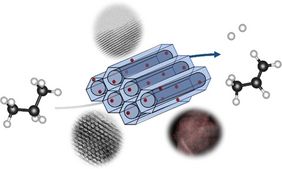A research team from the UniSysCat groups of Arne Thomas (TUB), Beatriz Róldan Cuenya (FHI) and Frank Rosowski (BasCat) presents a new catalyst for the production of propylene that offers high activity and stability: cobalt nanoclusters embedded in porous aluminum oxide.
Propylene is one of the most important raw materials in the chemical industry and is used for the production of many downstream products. The nowadays dominant technology for producing propylene is steam cracking, using naphtha as the feedstock. However, the conventional production processes are no longer sufficient to meet the increasing demand for propylene, so an alternative process is gaining importance: propane dehydrogenation (PDH). PDH requires the use of suitable catalysts, the search for which is an active field of research.
Catalysts based on cobalt (Co) have been reported as active and selective in PDH. Due to their availability, low cost, and activity, cobalt-based catalysts are a promising alternative to rare and expensive platinum when it comes to industrial application. Since it is known that isolated cobalt ions (Co2+) are the active species for dehydrogenation, the authors focused on small Co2+ nanoclusters. They synthesized these nanoclusters and made them self-assemble in the pores of mesoporous aluminum oxide to form their new catalyst material.
The authors characterized the morphology and composition of their catalysts using different sophisticated in-situ and ex-situ microscopy and spectroscopy techniques. They found that the ordered mesoporous structure of the aluminum oxide support is preserved under industrially relevant conditions. The cobalt nanoclusters are found to be very small (1 nm) and well-incorporated into the structure of the mesoporous support. Like the support material, also the cobalt nanoclusters are remarkably stable under reaction conditions.
Finally, they compared the properties of their new catalyst material with those of Co2+ nanoclusters impregnated on commercial non-porous aluminum oxide. The resulting material is found to be far less stable.
The detailed study of the nature of the cobalt sites and the properties of the aluminum oxide supports, provides a deeper understanding of cobalt-based catalysts for dehydrogenation reactions.
This study has been published in ACS Catalysis: ACS Catal. 2024, 14, XXX, 9993–10008, 2024, https://doi.org/10.1021/acscatal.4c02067



